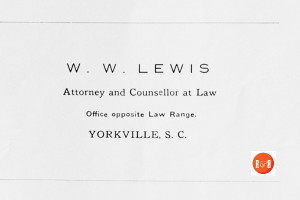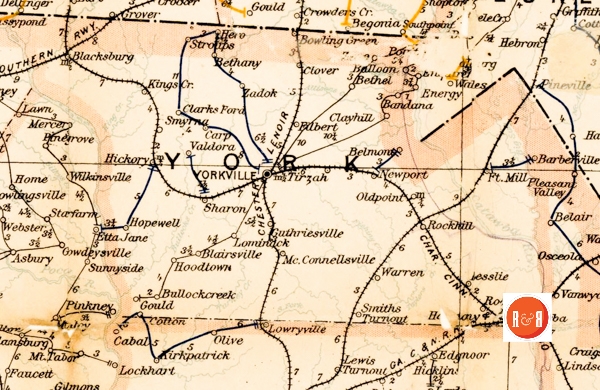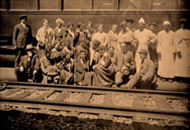As the town of Rock Hill grew from a railroad depot village to a population and market center of the county, its leaders decided that it deserved to become a courthouse town for a new county. Colonel J. M. Ivey of Rock Hill and Colonel W. R. Davie of Chester County sent an extensive letter to the South Carolina Legislature in May 1880, outlining the necessity of Rock Hill becoming a courthouse town.
The men extracted data from the records of the comptroller-general showing that the value of York County acreage had grown from nearly $230,000 in 1848 to $2.5 million in 1880. So, in wanting to create a new county, Ivey and Davie made the remarkable request that the legislature amend the state’s Constitution to reduce the square mileage required for counties from 625 to 350.
This was not the first time a portion of the county sought withdrawal and made overtures for the formation of a new county. Beginning in 1827, citizens living in the most western portion of the county complained to state legislators of the hardship in having to travel more than 20 miles to conduct their legal business in Yorkville (now York). The discussion was again put before the House of Representatives in 1842 and also raised in 1880, eventually resulting in the creation of Cherokee County from portions of York, Union, and Spartanburg counties.
As the formation of a new county to the west seemed inevitable,

Image ca. 1912 – Courtesy of the YC Historical Society
the discussion over one on the eastern side overheated and became a pivotal point for candidates running in the 1888 elections. For candidates opposing a county on the Catawba River, Western York County was a safe place to express their view. Many living in the area scoffed at the idea and laughingly called it the “Shoestring County” because of its elongated shape and rambling lines. Representative W. N. Elder came to Hoodtown in Bullocks Creek Township in June, saying he opposed the idea and that York County was perfectly formed, with a river on each side and the North Carolina state line on the north.
During the 1896 debate, Representative W. N. Elder came to Hoodtown on June 20 and gave his views on the formation of Catawba County. No doubt he had read Henry Hood’s comments in the Yorkville Enquirer, on the political desires of Western York County. Hood declared, “We [must] elect men who will work to the best interest of the masses of the people, the conditions necessary to the formation of new counties may be more easily met and not necessarily, strictly according to justice and constitutional right.” Elder, unopposed by anyone from the eastern side of the county, bravely aired his opinion on the issue again, saying he opposed the idea, that he believed York County was perfectly formed with a river on each side and the state line to the north, and that any division would make both counties ill shaped.
About 25 miles away in Gaffney, there were many like candidate Richard M. Jolly who supported the creation of Cherokee County and were convinced that should a new county be formed on the Catawba, it would doom the formation of one on the Broad. A few days after losing his bid for the South Carolina Legislature, Jolly went to Columbia and was an overnight guest of Governor Gary Evans. He wanted Evans to appoint him the Doorkeeper of the Lower House, giving him the opportunity to become “intimately acquainted with the delegates” of the upcoming Democratic State Convention. His plan was to develop a working relationship with the members before the subject of new counties was placed on the docket and sway the vote to derail the Rock Hill lobbyists.
The Governor was agreeable, and three months later, he appointed Jolly to that position. As Jolly had hoped, he was able to get the convention to approve a bill requiring that all new counties must, among other requirements, embrace 20 square miles. While this set the Rock Hill lobbyists aback, they rebounded by securing the passage of a bill that made the basis for county incorporation to be strictly on the amount of capital invested. These lobbyists were so delighted with its passage that one bet Jolly 15 to one that Rock Hill would have a new county. Jolly later confessed that had the question been voted on that day, he would have lost the bet.
During the evening before the House voted, Jolly, had a private discussion with Yorkville attorney William Brice. Brice agreed that he would help Jolly in his efforts to get a county formed on the Broad river, provided that Jolly would assist him in thwarting Rock Hill’s plan. The next morning, they were on the floor with a petition asking the convention not to vote for Rock Hill’s request.
When the vote came, representatives from Spartanburg voted for Rock Hill in a calculated but unsuccessful attempt to save their part of the county from being included in a new county on the Broad River. Jolly’s efforts paid off, and he reported the success, saying, “In that way Rock Hill was beaten with the slogan, ‘Equal right to all; special privileges to none,’ in a six to one landslide.”
Having defeated Rock Hill’s bid, Gaffney residents were ready to canvass the voters in preparation for an election on the proposed county. The law required that each township vote separately on the question with a two-thirds majority for passage, and not everyone was in favor. Once the lines were surveyed to include 20 square miles of York, Spartanburg, and Union counties, proponents began efforts to convince those who were unsure of the benefits.
Traveling in a buggy, Jolly and Booth Butler canvassed Cherokee Township through a series of meetings at Pearson’s Schoolhouse. During one of the meetings, someone got up and shouted, “Let Cherokee … name her baby, and we will vote for it.” When asked what he thought would be a proper name, he demanded, “Cherokee!” Thus, the people of Cherokee Township in York County gave their name to the new county.
Sometime after this meeting and just before the deciding election, Blacksburg hosted a meeting where opponents could voice their reasons for opposition. Attorney Brice of Yorkville was invited to make an opposing speech, but at dinner, Jolly reminded Brice that he had promised to help with the formation of Cherokee County in return for “helping him blast the hopes of Rock Hill.” Brice rose from the table and boarded a train back to Yorkville without making his speech. Cherokee County was born in 1897.
Though Ivey and Davie did not see their dream realized, Rock Hill continued to toy with the idea. It surfaced again in 1916, and in early May of that year, A. L. Gaston of Chester County wrote York attorney W. W. Lewis, requesting a meeting with him and Senator Ketchin to discuss bringing a suit to test the constitutionality of the Act of 1912 that opposed “ill shaped counties.” Later in the month, Lewis wrote Gaston, J. E. McDonald in Winnsboro, and J. H. Marion of Chester, that he was concerned that the Supreme Court might agree that the Act was constitutional and question why they were acting prematurely.
Lewis writes, “To put the matter in a nutshell, I anticipate something like this will happen: Mr. Marion is arguing the case. He is endeavoring to sustain the Constitutionality of the Act of 1912. Mr. Justice Hydrick interrupts counsel with a question something like this: ‘now, Mr. Marion, you are seeking to enjoin the Commissioners from proceeding upon the ground that their further proceeding will be illegal. Please point out to the Court something that the Commission has done that is illegal, or something that it is quite sure they will do that is illegal.’ As I see it, the only answer that can be given is that the Commission has done nothing illegal. Then Mr. Justice Hydrick will answer, ‘Please state how this Court can enjoin anybody from doing something that is admitted to be legal.” Lewis felt they “would be butting our heads against a stone wall” and appear foolish in front of the court.
From the beginning, Yorkville businessmen suspected Rock Hill’s desire was economically motivated and, if successful, would shift the market in their favor. Only recently, Rock Hill had invested $60,000 in Winthrop College in hopes of making it a state institution. A rumor began to circulate that the city was making overtures to get the county to pay for their investment, but one Rock Hillian snapped, “Rock Hill is amply able to pay her own debts and does not expect any help from Yorkville or York County.”
Others suspected that the Rock Hill Land and Townsite Company was the power behind the throne, hoping to raise land values. But again, Rock Hill strongly denied the company or its President Wilson had any special interest in the proposal. Some county leaders feared that the town would want the county to fund a new courthouse and related buildings.
The Rock Hill Herald and the Yorkville Enquirer became sounding boards for the two factions. J. J. Hull, editor of the Rock Hill paper, had no compunctions about name calling. He labeled any opponent of the move as “misguided, mouthy, narrow-minded and selfish.” When a correspondent to the Enquirer stated, “The people of Yorkville and York County, particularly the country people, are stirred as they have not been stirred in years” and were “boiling hot with indignation.” Hull denied opposition was wide-spread and cited the selfish interest of Yorkville lawyers as instigators of any opposition that may have existed. A delegation consisting of McIver Hughes, W. W. Miller, and A. T. Neely of Newport; W. B. Crosby of Landsford; W. H. Edwards of Belmont; T. F. Lesslie of Lesslie; T. M. Allen of Harmony; and J. B. Johnson, J. R. Faries, Julius Friedheim, A. R. Smith, A. E. Smith, A. F. Ruff, R. T. Fewell, A. C. Izard, and J. H. Miller of Rock Hill was formed to lobby state officials for a new county. They left with a heady and exclusive declaration that if their petition was granted, they would organize “the best, most prosperous, most progressive county in the state, independent of the influence of The Enquirer, The Yeoman, the courthouse lawyers or any other outside agency!”
A committee of Western York County men who opposed the secession was formed by R. M. Carroll, W. J. Stevenson, J. H. Saye, Joseph A. Smith, and M. S. Carroll. The Rock Hill Herald accused them of being induced by a “battery of lawyers.” When a second committee was formed to assist the first, the editor did not hesitate to publish their names, along with their occupation, “T. F. McDow, lawyer; W. B. DeLoach, lawyer; G. W. S. Hart, lawyer; W. B. McCaw, lawyer; D. E. Finley, lawyer; M. F. Jones, non-resident merchant; R. W. Hudson, lawyer who has not been in the county long enough to be known away from the courthouse; W. B. Moore, intendent; B. N. Moore and G. H. O’Leary.”
The topic of moving the county seat to Rock Hill still surfaces from time to time, but it still fails to gain traction and always proves to be a source of contention between York and Rock Hill.
J.L. West – Author
This article and many others found on the pages of Roots and Recall, were written by author J.L. West, for the YC Magazine and have been reprinted on R&R, with full permission – not for distribution or reprint!
Stay Connected
Explore history, houses, and stories across S.C. Your membership provides you with updates on regional topics, information on historic research, preservation, and monthly feature articles. But remember R&R wants to hear from you and assist in preserving your own family genealogy and memorabilia.
Visit the Southern Queries – Forum to receive assistance in answering questions, discuss genealogy, and enjoy exploring preservation topics with other members. Also listed are several history and genealogical researchers for hire.
User comments welcome — post at the bottom of this page.
Please enjoy this structure and all those listed in Roots and Recall. But remember each is private property. So view them from a distance or from a public area such as the sidewalk or public road.
Do you have information to share and preserve? Family, school, church, or other older photos and stories are welcome. Send them digitally through the “Share Your Story” link, so they too might be posted on Roots and Recall.
Thanks!
User comments always welcome - please post at the bottom of this page.




Share Your Comments & Feedback: